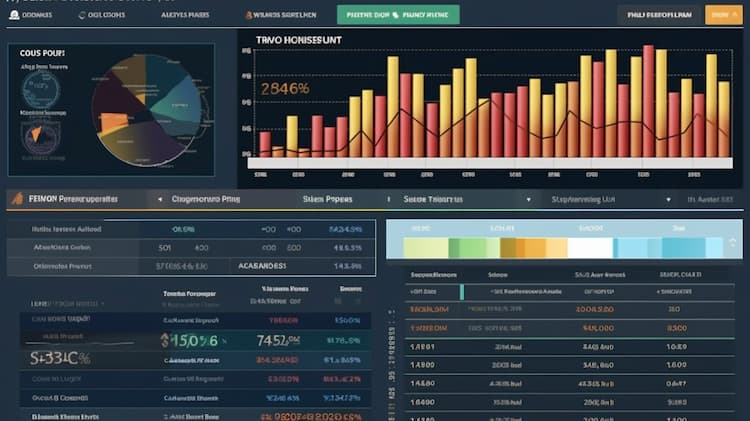
How does the URTY ETF work?
The URTY ETF is a specialized investment fund that focuses on a specific sector. This exchange-traded fund offers investors exposure to a range of companies in this sector.
ProShares Trust, as the issuer of URTY, focuses on providing leveraged exposure to the small-cap segment of the U.S. stock market through its investment strategy. The fund aims to replicate daily returns consistent with the Daily Target, which is based on the performance of the FTSE Russell Index. This index comprises approximately 2,000 of the smallest companies in the Russell 3000® Index, representing about 7% of its total market capitalization. ProShares achieves its investment objectives by investing primarily in financial instruments such as equity securities, derivatives (including swap agreements and futures contracts), and money market instruments (such as U.S. Treasury Bills and repurchase agreements). Using a mathematical approach, ProShare Advisors determines the appropriate mix of these instruments to maintain leveraged exposure consistent with the Daily Target. The fund seeks to remain fully invested at all times, periodically rebalancing its portfolio to adjust exposure in response to movements in the Index. However, it may also invest in securities not included in the Index to achieve its investment objectives. Investors interested in URTY should refer to the Fund's Prospectus for comprehensive details on its investment objectives, strategies, and associated risks.
URTY, an exchange-traded fund (ETF) offered by ProShares Trust, does not typically distribute dividends in the traditional sense. Instead, URTY seeks to provide leveraged exposure to the daily performance of the small-cap segment of the U.S. stock market. As such, any returns generated by the fund are primarily reflected in changes in its net asset value (NAV) rather than through dividend payments. Investors interested in potential income from URTY may consider the potential for capital appreciation as the fund's underlying securities appreciate in value over time. However, it's essential to note that URTY's investment strategy focuses on achieving daily returns consistent with its stated objectives, and its performance may not directly correlate with dividend-paying stocks or indices. Prospective investors should review the Fund's Prospectus for detailed information on its dividend policy and investment strategy.
URTY, managed by ProShares Trust, employs a tracking strategy to replicate the daily performance of its underlying index, the FTSE Russell. The fund seeks to achieve this objective by investing in a combination of financial instruments, including equity securities, derivatives, and money market instruments, that closely mirror the movements of the small-cap segment of the U.S. stock market represented by the index. ProShare Advisors utilizes a mathematical approach to determine the optimal allocation of these instruments to maintain consistent tracking with the Daily Target. While URTY aims to provide investors with leveraged exposure to the index's performance, it's important to note that tracking errors may occur due to factors such as market volatility, liquidity constraints, and the fund's rebalancing activities. Investors should refer to the Fund's Prospectus for a comprehensive understanding of its tracking methodology and associated risks.
URTY, an ETF managed by ProShares Trust, typically exhibits a high correlation with its underlying index, the FTSE Russell. The fund's investment strategy aims to provide leveraged exposure to the daily performance of the small-cap segment of the U.S. stock market, as represented by the index. Consequently, URTY's returns generally move in tandem with fluctuations in the index. However, it's crucial to acknowledge that factors such as market volatility, liquidity conditions, and the fund's use of financial instruments, including derivatives, may introduce some level of tracking error and cause deviations in correlation over short periods. Investors should assess the Fund's Prospectus for detailed information on its correlation with the underlying index and potential sources of tracking divergence.
URTY, managed by ProShares Trust, primarily focuses on providing leveraged exposure to the small-cap segment of the U.S. stock market, as represented by its underlying index, the FTSE Russell. As such, the fund's sector allocation is largely dictated by the composition of the index, which encompasses approximately 2,000 of the smallest companies in the Russell 3000® Index. While the specific sector allocations within URTY may vary over time due to changes in market dynamics and the index's constituents, investors can generally expect exposure to a diverse range of sectors that typically characterize small-cap stocks, including but not limited to technology, healthcare, consumer discretionary, industrials, and financials. ProShare Advisors employs a mathematical approach to determine the optimal allocation of the fund's assets across these sectors to achieve its objective of replicating the daily performance of the index with leverage. However, it's important for investors to review the Fund's Prospectus for comprehensive details on its sector exposure and investment strategy.
URTY, managed by ProShares Trust, offers investors leveraged exposure to the small-cap segment of the U.S. stock market through its investment strategy. The fund seeks to replicate the daily performance of its underlying index, the FTSE Russell, which comprises approximately 2,000 of the smallest companies in the Russell 3000® Index. ProShare Advisors utilizes a mathematical approach to determine the optimal mix of financial instruments, including equity securities, derivatives, and money market instruments, to achieve this objective. By maintaining exposure to these assets, URTY aims to magnify the daily returns of its underlying index, providing investors with amplified exposure to the small-cap market. However, it's essential to recognize that leveraged exposure also entails heightened risk and potential for increased volatility, which investors should consider carefully. Prospective investors should consult the Fund's Prospectus for detailed information on URTY's exposure strategy, associated risks, and investment objectives.

ETF Insider is a data-driven portfolio analytics and optimization platform that introduces a more efficient and practical way to visualize, analyze and optimize portfolios.
Rather than focusing on the surface-level attributes of ETFs and Mutual Funds, ETF Insider goes deeper by examining the underlying holdings of exchange traded products.
By organizing and structuring that data, investors can easily navigate within their overlapping layers.
This innovative perspective combined with modern data visualization and modeling tools, provides an entirely new approach to portfolio optimization that can quickly expose both portfolio inefficiencies and opportunities.

The URTY ETF is a specialized investment fund that focuses on a specific sector. This exchange-traded fund offers investors exposure to a range of companies in this sector.

The article "What is the VCAR ETF?" offers an insightful exploration into the Vanguard Car ETF (VCAR). It describes the fund's focus on companies involved in the automotive industry, including its investment strategy, performance history, and potential risks, providing a comprehensive overview for investors interested in this specific sector.

The ETF with Tesla, Inc. and Broadcom Inc. Exposure (Nasdaq) exposure provides investors with an opportunity to diversify their portfolio while gaining insight into the performance and potential of Tesla, Inc. and Broadcom Inc. Exposure (Nasdaq). This ETF offers a comprehensive view of the company's standing in the market, its historical performance, and future prospects.
ETF Insider is a novel portfolio optimization tool that uses the power of data visualization to gain insight into portfolio compositions, concentration risks, portfolio efficiency and more. Complex financial data can be transformed into visually appealing and easily digestible graphs and charts, allowing investors to quickly identify trends and make well-informed investment decisions. Not only does this save time, but it also increases the accuracy and effectiveness of portfolio management.